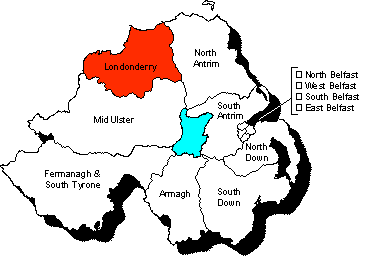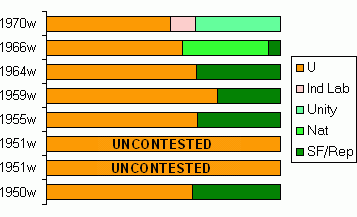

 |

|
|
|
|
|

|

|
| Map and diagram by Conal Kelly | |
This constituency, located in the north-western corner of Northern Ireland, was established in 1948 and incorporated much of the county of Londonderry including the city of Londonderry. Between 1950 and 1970 the constituency was represented by just three different MPs, all of whom were Unionist. All elections held during this period were contested with the exception of the 1951 general election and a by-election held in the same year. In both cases the winner was Unionist nominee William Wellwood.
See also election results for Londonderry 1973-1982.
| U | Ind Lab | Nat | Unity | SF/Rep | |
| 1970w | 53.1% | 10.3% | 36.6% | ||
| 1966w | 58.1% | 37.1% | 4.8% | ||
| 1964w | 64.1% | 35.9% | |||
| 1959w | 73.0% | 27.0% | |||
| 1955w | 64.5% | 35.5% | |||
| 1951w | * | ||||
| 1951w-b | * | ||||
| 1950w | 62.6% | 37.4% |
* The only candidate nominated for the 1951 By-Election and the 1951 General Election was Unionist William Wellwood. He was therefore duly elected without a contest.
Unionist majority: 12,135; electorate: 90,302; votes cast: 81.6%
Chichester-Clark
contested his fifth and final election in 1970. His primary opposition was
Nationalist Party leader Eddie McAteer who was contesting the election
under the Unity banner. Also contesting the election as an Independent
Labour candidate was Eamonn McCann, one of the original organizers of
the Northern Ireland Civil Rights Association (NICRA). When the
counting was completed, Chichester-Clark was returned to serve his
fifth consecutive term at Westminster.
Chichester-Clark's brother James had succeeded Terence O’Neill,
becoming the fifth Prime Minister of Northern Ireland in 1969. In
the Northern Ireland House of Commons Eddie
McAteer represented the constituency of Mid Londonderry from 1945 to
1953 and the constituency of Foyle from 1953-1969. His brother, Hugh,
had also unsuccessfully contested the Londonderry seat in 1950 and
1964 under the Republican banner. Eamonn McCann would later join the
Socialist Workers Party and was a founding member of the Socialist
Environmental Alliance (SEA).
Unionist majority: 12,562; electorate: 78,191; votes cast: 76.4%
Now the Chief Conservative spokesman for Northern Ireland, Chichester-Clark was contesting his fourth general election. This time, however, he faced two opponents, Nationalist Patrick Gormley and Republican Neil Gillespie. The result was another victory for Chichester-Clark although his majority was reduced for the second election in a row. On the nationalist side Gormley managed to out-poll his Republican rival by 8:1. Gormley would later win election to the Northern Ireland House of Commons for Mid-Londonderry in May 1966.
Unionist majority: 16,577; electorate: 76,918; votes cast: 76.5%
Chichester-Clark again represented the Unionist Party in Londonderry seeking his third successive win. His opponent on this occasion was Hugh McAteer, standing on a Republican abstentionist ticket (Sinn Fein were now a proscribed organization). Hugh McAteer, a former IRA Chief of Staff, had unsuccessfully contested the seat in 1950. The result was never really in doubt with Chichester-Clark winning by a comfortable margin, although his majority was reduced by almost 7,000. McAteer managed to improve on the Sinn Fein result of 1959 but not on his performance of 1950.
Unionist majority: 23,657; electorate: 73,241; votes cast: 70.2%
The incumbent Chichester-Clark once again squared-off with his Sinn Fein opponent Manus Canning in a repeat of the 1955 election. Chichester-Clark successfully defended his seat and increased his majority to over 23,000. In a lower turnout than 1955, the Sinn Fein vote declined significantly. This was a trend repeated elsewhere in Northern Ireland in light of the IRA's divisive Operation Harvest campaign.
Unionist majority: 16,033; electorate: 71,297; votes cast: 77.6%
Following Wellwood's retirement, the Unionists nominated Robin Chichester-Clark, whose brother James was then Unionist Government Chief Whip and a future Prime Minister of Northern Ireland. His opponent was Manus Canning representing Sinn Fein on an abstentionist ticket. The result was a clear victory for Chichester-Clark with a majority of just over 16,000.
Unionist Candidate Elected Unopposed.
Wellwood, who had been elected to Westminster only five months earlier in an uncontested by-election, was one again the Unionist candidate. As was the case earlier in the year, Wellwood the sole candidate was duly elected without a contest. Londonderry was one of four constituencies in Northern Ireland to go uncontested in 1951.
Unionist Candidate Elected Unopposed.
This by-election was caused by the appointment of the incumbent Sir Ronald Ross to the position of Northern Ireland Government Agent in London. In his place the Unionist Party nominated William Wellwood. As the sole candidate nominated for the 1951 By-Election, Wellwood was duly elected without a contest.
Unionist majority: 14,722; electorate: 72,515; votes cast: 80.6%
The constituency of Londonderry had undergone significant revision since the last election, losing its south-western portion to the new constituency of Mid-Ulster. Ross, who had been first elected in 1929, was once again representing the Unionist Party. His opponent was Hugh McAteer, standing on a Republican abstentionist ticket, while serving a 15 year sentence for treason. McAteer was a former IRA Chief of Staff and a brother of Eddie McAteer, a future leader of the Nationalist Party. In the end Ross was able to achieve a comfortable victory and significantly increased his majority. McAteer would make another attempt at the seat in 1964.
See also:
Results from 1950 to 1970 for each seat: East Belfast | North Belfast | South Belfast | West Belfast | North Antrim | South Antrim | Armagh | North Down | South Down | Fermanagh and South Tyrone | Londonderry | Mid Ulster
Other sites based at ARK: ORB (Online Research Bank) | CAIN (Conflict Archive on the INternet) | Northern Ireland Life and Times Survey
Your comments, please! Send an email to me at nicholas.whyte@gmail.com.
Conal Kelly, 1 June 2007.
|
Disclaimer:©
Nicholas Whyte 1998-2004 Last Updated on Wednesday, 12-Jan-2005 12:12
|